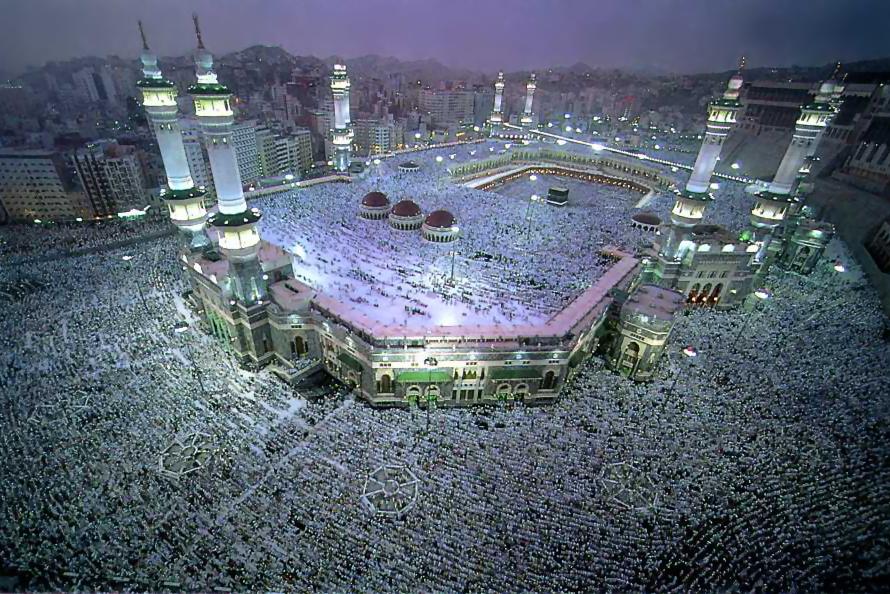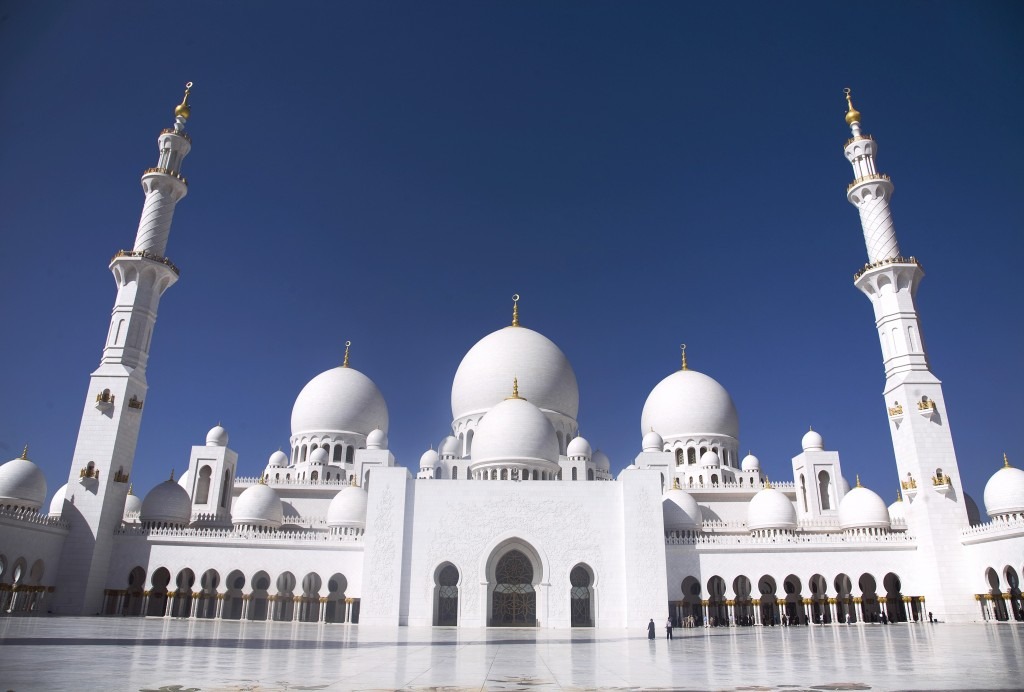ISLAM:
The Religion of Muslims and Mohammed
Islam is a monotheistic religion that believes in the prophecy of Abraham through the Qur’an,which is considered to be the verbatim word of god (Allah), and Mohammed’s (600CE) example . Mohammed is considered to be the last prophet of god. Any adherent to the religion is called Muslim.
Practitioners believe god is all-powerful, incomparable, and that the purpose of their existence is to worship god. Muslim adherents believe their faith is a complete and universal truth passed down from Abraham, Noah, Adam Moses, and Jesus. They consider the Qur’an to be the final revelation of god and believe strongly in 5 pillars or concepts at the foundation of Islam.
The Five Pillars:
- Faith – the creed of Islam recited under oath
- Prayer – also known as salat, these are rituals prayers during the day
- Zakat – alms giving and supporting the poor
- Fasting – performed usually during Ramadhan
- Pilgrimage to the mecca to follow in Abraham’s footstep ritualistically
There are two primary sects of the religion: Sunni(75-90%) and Shia(10-20%). 13% of Muslims live in Indonesia, 25% in South Asia, 20% in the Middle East, and 15% in Sub-Saharan Africa. Its followers comprise 23% of the world’s population.
Islam in the Modern World
Islam is one of the most submissive religions in the world. They recite oaths of submission to god’s will and believe the purpose of their existence is to worship god, which puts them in a state of complete surrender. This surrender leads to them feeling safe and at peace with their existence under god. They consider the Qur’an to be the true and unaltered word of god. They believe their holy books are the truth.68% and 80% of Shias lived in four countries: Iran, Pakistan, India and Iraq. Islam also has many laws that affect nearly every aspect of life for adherents. Islam has many very strict beliefs which has led to misinterpretation and misunderstanding over the past millennia, especially within the religion of Islam. One of these misunderstood concepts is the concept of Jihad.
Most Muslims are NOT Violent!
It is important to understand that even though people in America and the Western world think that Islam might be a violent religion, it is the exact opposite. 6.5% of the Muslims in the world felt that the attacks of 9/11 were justified and represents about 65 million Muslims; still a very large population, but a small percentage of the 1.65 billion muslims.
There are a few beliefs in Islam that when combined, create beliefs that create room for justify truly extremist acts such as 9/11, because of various verses in the Qur’an and different influential leaders promoting extremist action. There is absolutely an in-group that is created within the believers of Islam where the believers feel that they are special and correct in their beliefs, especially opposed to Christians, Jews, and other western religions.
The beliefs of Jihad, Predestination, and many of the literal interpretations of the Qur’an have led to an explosive anti-hero/terrorist movement in many of the sects that are highly devotional and in poorer countries with less education and rights. This has led to holy wars in the 1980s in Northern Africa and the Middle East and culminates in Osama Bin Laden’s declaration jihad against the United States and subsequent attacks on New York on September 11th. Bin Laden was a part of al-Quaeda whose goal was Islamic world domination, but this is an extremist group. The vast majority is Muslims are not members of al-Quaeda or ISIS and even the members of those groups are most likely deluded and heavily traumatized.
ISIS: An Evolution from Al-Quaeda
ISIS, or the Islamic State of Iraq and Syria is a salafi jihadist militant and extremist group that has proclaimed itself the caliph recently, on June 29th 2014, which means religious, military, and political power of muslims worldwide. Of course, the vast majority of muslims want nothing to do with this, but the insurgence has spread recently into northern Africa and has gained momentum. The group has significant momentum since it is formed from the remaining members of al-Qaeda, but at this point the two have separated completely in ideologies and ISIS has become a unique entity in and of itself. The Syrian Civil war was an excuse for extremists to militarize in conjunction with Iraqi militants and jihadists fleeing the presence of the United States military.
Now the two forces of al-Qaeda and ISIS are competing for militant recruitment in places like Yemen and Syria. There is also a presence in the Philippines, Libya, Pakistan, Algeria, Egypt, Nigeria, Afganistan, and of course in Iraq.
The goal of the group is to found the Sunni Islamic State under the caliph who is believed to be the successor to Muhammed. This Salafi group promotes religious violence and regards all others as infidels or apostates. This is a waves of religious fundamentalism that enforces rituals with capital punishment and execution. The religion is their foundation for growing power of the religious state.
This is one of the most interesting sects of the religion, but represents a minority; though they are proficient at using social media to display their horrific actions. They are regarded by the western world as extremist terrorists and rightfully so. Even the majority of their own religion deem them to be deluded extremists.
Positive Aspects of the Islamic State
The vast majority of the adherents of Islam do not fit the profile I described above. In fact, the majority of the Muslims that I have met have been extremely kind and well-wishing, welcoming and neighborly. I even met a very peaceful guy from Yemen while I was in India whose family was involved in the Civil War. It is very sad for everyone to see this kind of violence and trauma and there is not much logic that can explain why it occurs.
Ritual Prayers
Salah or Salat must be performed five times a day with no exemptions. Salat is intended to focus the mind upon god and is seen as a personal communication with him of gratitude and worship. Lines of the Qur’an are recited in Arabaic. Mosques are places that are available for prayer, or as places or study, or learning.
Discipline
Both fasting, alms giving to the poor, and pilgrimages are required in the religion, yielding trials of great difficulty for adherents.
Home Life
The religion is primarily focused on life at home, though many religious texts sanctify the beating of women. There is special etiquette and diet including no meat, carrion, alcohol, or blood. Marriage in Islam is a civil acceptance where the groom is required to pay for the bride as a part of their contract.
Criticisms of Islam
Criticism of Islam has existed since its inception, for obvious reasons as the religion is a reformation from Judaism and Christianity. Early criticism came from Christians as radical heresy and later appeared more significantly from Judaism.
The majority of the criticisms are the morality of the life of Mohammed, issues relating the authenticity of the Qur’an and other questions of human rights, especially in regards to women. The questions of the founder’s authenticity and the authenticity of holy works are the criticisms of every major religion including christianity, Judaism, and Buddhism.
Conclusion
Islam obviously has its own ups and downs as a religion, but its impact upon the civil rights of humans has to be mitigated if the religion will survive in the western world. However, much of the extremist propaganda is currently growing in northern Africa and the Middle East, of particulate note to the United States and Europe. This will be a religion whose ideals are dynamic and that changes drastically to fit the changing cultures of its proprietors.
I would love to hear about any experiences that you have had with the Islamic adherents that you have met or any other surprises you have gotten from adherents of the religion. Check back in a week to pagayogi.com for my next article on the ideals of Islam and how terrorism and heroism have intersected to form an ideology that is changing the world.
References:
- Wikipedia
- Islam Origins
- An Overview of Islam
- The Belief System of Islam
- Problems in Modern Islam
- The Biggest Problem in Islam
- Heavy Review of Islam
- 25 Deadly Terrorist Attacks
- FBI on Terrorism
- Islam and Violence


